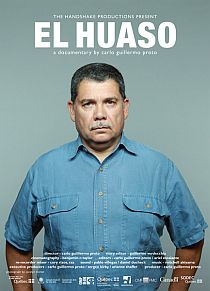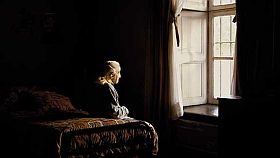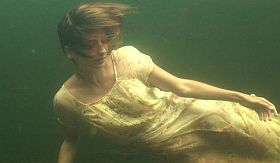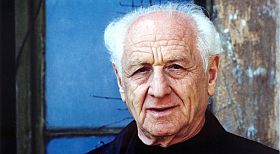Super-active young Russian director Georgy Molodtsov has before provided information to filmkommentaren. This time he informs us about a new activity that he is involved in as one of the newly elected members of Russian Guild of Documentary Film and Television that presents rating of the most popular Russian documentary films at the specialized documentary festivals in Russia and in the world in 2012. Here is the press release of the Guild with visions and concrete work:
It is well known that non-fiction films path to the big screen is not easy: there is almost no system of commercial release, shows at festivals and cinema clubs are irregular and accessible to a limited number of people. Besides, it is not always possible to find the film’s complete description in open sources.
It is necessary to make the path to viewers easier for the truly creative, socially important professional projects. This is why the new administration of the Guild of Documentary Film and Television has chosen the creation of a unified coordinated channel, a large Internet website of the Russian documentary films, as its foremost goal.
This Internet resource is being developed now and will start its work at the Guild’s new portal http://rgdoc.ru
The Guild’s first project is monitoring existing places of non-fiction film shows and rating the most popular Russian documentary films at the specialized documentary festivals in Russia and in the world in 2012.
The Rating is fully accessible here: http://rgdoc.ru/projects/reyting-festivalnogo-prokata/top-50/
The rating’s based on the results of nine specialized Russian festivals (featuring documentary films or featuring a competition of such films): Message To Man, Flahertiana, ArtDocFest, Rossia, Okno to
Europe Film Festival, Stalker Human Rights International Film festival, Moscow International Film Festival, Saratovskie Stradaniya, INPUT Conference.
Additionally the rating considers nominees’ participation in Russian film awards (LAVR, Bely Slon, TEFI, NIKA, The Golden Eagle), documentary film programs of non-specialized Russian festivals (Kinotavr, Golden Knight, Moscow Premier Okkupai.Doc, Sol Zemli, Texture, 2morrow), and CIS festivals (Listapad, Molodist, Tbilisi Film Festival, Golden Apricot Yerevan, DOCUDAYS UA), and in all international film festivals that feature documentary film shows.
Scoring was based both on the victories and awards a film received and film’s participation in competition and non-competition programs. Detailed information on the system of rating scores can be found at the Guild’s website here: http://rgdoc.ru/projects/reyting-festivalnogo-prokata/.
Over 200 Russian documentary films were shown at the festivals in 2012, rating experts discovered. It means that the films of Russian documentary filmmakers are in demand at festival shows and possess the potential to draw wider audience if shown in a network of Russian cinema clubs, and partly, on the federal and regional TV channels.
Top 20 films of 2012 Rating List are:
1. ДА ЗДРАВСТВУЮТ АНТИПОДЫ! (Vivan Las Antipodas!), directed by Victor Kosakovsky (PHOTO)
2. ЗАВТРА (Tomorrow), directed by Andrey Gryazev
3. КНИГА ТУНДРЫ. ПОВЕСТЬ О ВУКВУКАЕ – МАЛЕНЬКОМ КАМНЕ (The Tundra Book. A Tale of Vukvukai, the Little Rock), directed by Aleksey Vakhrushev
4. ЗИМА, УХОДИ! (Winter, Go Away!), by Marina Razbezhkina Studio
5. АНТОН ТУТ РЯДОМ (Anton’s Right Here), directed by Lyubov Arkus
6. ПЛЭЙБЭК (Playback/ Dur d’être Dieu), directed by Antoine Cattin, Pavel Kostomarov
7. ВНУТРИ КВАДРАТНОГО КРУГА (Inside a Squire Circle), directed by Valery Shevchenko
8. OUTRO, directed by Yulia Panasenko
9. РОЖДЕННЫЕ В СССР: 28 ЛЕТ (Born in the USSR: 28 up, part 1 and part 2), directed by Sergei Miroshnichenko
10. ПО ДОРОГЕ ДОМОЙ (On The Way Home), directed by Sergey Kachkin (Russia/Germany)
11. Я ТЕБЯ НЕ ЛЮБЛЮ (I Do Not Love You), directed by Pavel Kostomarov, Alexander Rastorguev
12. МИЛАНА (Milana), by Madina Mustafina
13. СОБАЧИЙ КАЙФ (Space Dog), directed by Ivan I. Tverdovsky
14. КАТЯ КРЕНАЛИНОВА (Katya Krenalinova), directed by Alexandra Likhacheva
15. ЧУВСТВЕННАЯ МАТЕМАТИКА (Colors of Math), directed by Ekaterina Eremenko
16. ШИРОКИЕ ОБЪЯТИЯ (Wide Embrace), directed by Yulia Kiseleva
17. ПИАНИЗМ (Pianism), directed by Ivan I. Tverdovsky
18. МАРШ, МАРШ, ЛЕВОЙ! (March, March with your Left!), directed by Evgenia Montaña Ibañez
19. ЛЕША (Lyosha), directed by Elena Demidova
20. ДОБРОЕ УТРО, МИТРОВИЦА (Good Morning, Mitrovitsa), directed by Irina Uraslkaya
The Top 20 List includes films by both recognized masters and debut diploma works of the young filmmakers. The films content varies a lot: from the vital political and social issues to all time poetic themes, which stands as an indirect proof that festivals’ jury and film selectors are unbiased.
The Guild’s research also aimed to see how many films were produced using financial support of the Russian Ministry of Culture. Only 50 films out of 200 had governmental support. It speaks of the low effectiveness of the system of governmental money distribution: most of the films sponsored by the Ministry of Culture never reach the viewers; on the contrary, the films that did not get any governmental subsidies became popular.
This kind of documentary film analysis has been accomplished for the first time. The Rating is due to possible changes because information from the filmmakers and film studios about the fate of their films is still coming in.
Conducting this kind of film effectiveness analysis annually and cooperating with the Ministry of Culture at the stage of applications for subsidies selection, the Guild of Documentary Film and Television hopes to enhance the quality of the system of financial resources distribution and facilitate the development of the effective system documentary films release and promotion.











